According to Civil Aviation Secretary Rajiv Bansal, the government is seeking to make it mandatory to combine jet fuel with sustainable aviation fuel as the nation seeks to minimise emissions.
"We are committed to reducing emissions by fossil fuels... the (civil aviation) ministry is working closely with the ministry of petroleum and natural gas on the issues related to Sustainable Aviation Fuel (SAF)," he said.
He was speaking at the IATA Aviation Energy Forum here. The International Air Transport Association (IATA) is an international grouping of airlines.
Bansal said both ministries are working to mandate a certain percentage of blending. "... that is still work in progress.
We do realise that unless we mandate over a period of time, demand will not be created," he added.
Elaborating on SAF, he said there are two important things -- the feed stock and production.
"Do we have as a country adequate feedstock for producing SAF? Are there technologies in place, proven, time-tested which will be able to produce SAF in quantities? And if I may say at a price the airlines can afford," Bansal said.
SAF is one of the key elements that will help to achieve emission reduction targets for the aviation sector.
Against the backdrop of the country's aviation sector slowly back on the growth path after being significantly impacted by the coronavirus pandemic, he asserted that "Indian aviation growth story is here to stay".
Further, Bansal mentioned supply chain issues being faced by domestic airlines, saying that those are hindering the growth of the aviation sector.
"Over the last few months, our Indian carriers have been struggling for want of engines being supplied by OEMs (Original Equipment Manufacturers).
"I don't want to name any particular OEM but today as we stand here, the pace at which Indian aviation wants to grow is getting actually hindered by global supply chains, OEMs not being able to supply at the pace at which this country is asking...," he noted.
